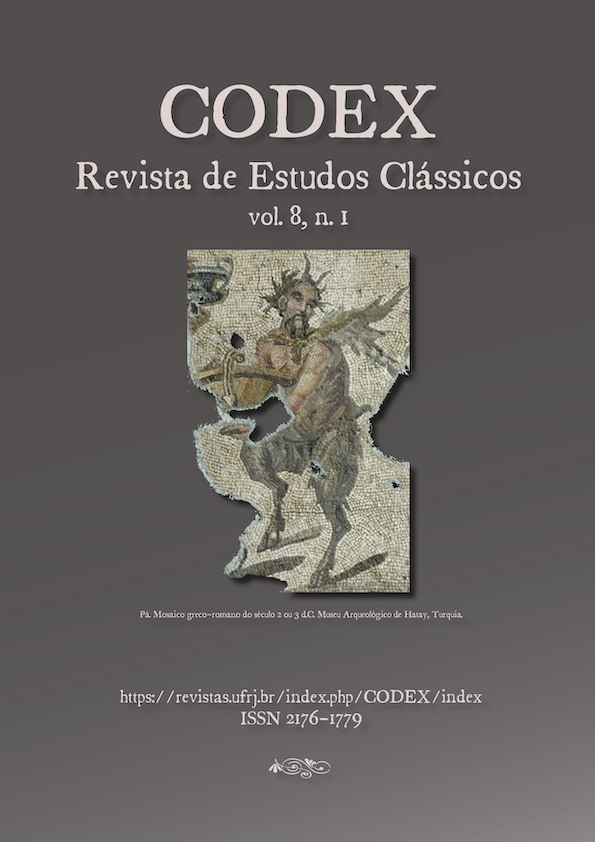Gênero e caracterização na "Medeia" de Eurípides
DOI:
https://doi.org/10.25187/codex.v8i1.32820Palavras-chave:
Eurípides, Medeia, caracterização, gênero.Resumo
Este trabalho examina a caracterização da personagem Medeia na tragédia homônima de Eurípides. Em primeiro lugar, observo como os seus discursos se conformam aos padrões de fala geralmente identificados como femininos na tragédia e como ela usa falsas fórmulas de submissão para enganar seus adversários. Em segundo lugar, investigo em que medida sua caracterização linguística também contém traços de um heroísmo mais tipicamente masculino, deixando entrever medos e angústias subjacentes aos estereótipos femininos da tragédia.
Referências
ALLAN, William. Euripides: Medea. London: Duckworth, 2002.
BOEDEKER, Deborah. Euripides' Medea and the Vanity of ΛΟΓΟΙ. Classical Philology, Chicago, v. 86, n. 2, p. 95-112, 1991. Disponível em: <https://www.jstor.org/stable/270231>. Acesso em 20 maio 2019.
BLONDELL, Ruby. Medea. In: BLONDELL, Ruby et al (Ed.). Women on the Edge: Four plays by Euripides. New York/London: Routledge, 1999. p. 147-215.
BONGIE, Elizabeth Bryson. Heroic Elements in the Medea of Euripides. Transactions of the American Philological Association, Baltimore, v. 107, p. 27-56, 1977. Disponível em: <https://www.jstor.org/stable/284024>. Acesso em 20 maio 2019.
BURNETT, Anne. Medea and the Tragedy of Revenge. Classical Philology, Chicago, v. 68, n. 1, p. 1-24, 1973. Disponível em: <https://www.jstor.org/stable/268785>. Acesso em 21 jul. 2019.
BURNETT, Anne Pippin. Connubial Revenge: Euripides' Medea. In: ______. Revenge in Attic and Later Tragedy. Berkeley: University of California Press, 1998. p. 192-224.
CHONG-GOSSARD, James H. Kim On & LI NG, Lin. Euripidean Women and Internalized Misogyny: Agones in Troades, Electra, and Andromache. In: PRATT, Louise; SAMPSON, C. Michael (Ed.). Engaging Classical Texts in the Contemporary World: From Narratology to Reception. Ann Arbor: University of Michigan Press, 2018. p. 71-90.
CUNNINGHAM, Maurice P. Medea ΑΠΟ ΜΗΧΑΝΗΣ. Classical Philology, Chicago, v. 49, n. 3, p. 151-160, 1954. Disponível em: <https://www.jstor.org/stable/265931>. Acesso em 21 jul. 2019.
EASTERLING, P. E. Women in tragic space. Bulletin of the Institute of Classical Studies, Oxford, n. 34, p. 15-26, 1987. Disponível em: <https://www.jstor.org/stable/43646826>. Acesso em 24 jun. 2019.
EMDE BOAS, Evert. Euripides. In: TEMMERMAN, Koen de; EMDE BOAS, Evert. Characterization in Ancient Greek Literature. Brill: Leiden, 2017. p. 355-374.
EURÍPIDES. Teatro completo. Volume 1. Tradução de Jaa Torrano. São Paulo: Iluminuras, 2015.
EURIPIDES. Medea. Edited by Donald J. Mastronarde Cambridge : Cambridge University Press, 2002.
FLORY, Stewart. Medea's Right Hand: Promises and Revenge. Transactions of the American Philological Association, Baltimore, v. 108, p. 69-74, 1978. Disponível em: <https://www.jstor.org/stable/284236>. Acesso em 27 jul. 2019.
FOLEY, Helene P. Tragic Wives: Medea’s Divided Self. In:______. Female acts in Greek tragedy. Princeton: Princeton University Press, 2001. p. 243-271.
GOULD, John. Law, Custom and Myth: Aspects of the Social Position of Women in Classical Athens. The Journal of Hellenic Studies, Cambridge, v. 100, p. 38-59, 1980. Disponível em: <https://www.jstor.org/stable/630731>. Acesso em 24 jun. 2019.
GREDLEY, Bernard. The place and time of victory: Euripides’ Medea. Bulletin of the Institute of Classical Studies, Oxford, n. 34, p. 27-39, 1987. Disponível em: <https://www.jstor.org/stable/43646827>. Acesso em 27 dez. 2018.
GRIFFITH, Mark. Antigone and Her Sister(s): Embodying Women in Greek Tragedy. In: LARDINOIS, André; MCCLURE, Laura (Ed.). Making Silence Speak: Women’s Voices in Greek Literature and Society. Princeton/Oxford: Princeton University Press, 2001. p. 117-136.
KNOX, Bernard. The Medea of Euripides. In:______. Word and action: essays on the ancient theater. Baltimore/London: Johns Hopkins University Press, 1979. p. 295-322.
KOVACS, David. Zeus in Euripides' Medea. The American Journal of Philology, Baltimore, v. 114, n. 1, p. 45-70, 1993. Disponível em: <http://www.jstor.org/stable/295381>. Acesso em 12 jul. 2012.
LORAUX, Nicole. Sur la race des femmes et quelques-unes de ses tribus. Arethusa, Baltimore, v.. 11, p. 43-87, 1978. Disponível em: <https://www.jstor.org/stable/26308154>. Acesso em 30 out. 2018.
MCCLURE, Laura K. Female speech and characterization in Euripides. In: DE MARTINO, Francesco; SOMMERSTEIN, Alan H. (Ed.). Lo spettacolo delle voci. Parte Seconda. Bari: Levante Editori, 1995. p. 35-60.
RECKFORD, Kenneth J. Medea's First Exit. Transactions of the American Philological Association, Baltimore, v. 99, p. 329-359, 1968. Disponível em: <https://www.jstor.org/stable/2935850>. Acesso em 17 jul. 2019.
SEGAL, Charles. Euripides' Medea: Vengeance, Reversal and Closure. Pallas, Toulouse, n. 45, p. 15-44, 1996. Disponível em: <https://www.persee.fr/docAsPDF/palla_0031-0387_1996_num_45_1_1392.pdf>. Acesso em 25 out. 2018.
WILLIAMSON, Margaret. A Woman's Place in Euripides' Medea. In: POWELL, Anton (Ed.). Euripides, Women, and Sexuality. London/New York: Routledge, 1990. p. 16-31.
ZERBA, Michelle. Medea Hypokrites. Arethusa, Baltimore, v. 35, n. 2, p. 315-337, 2002. Disponível em: <https://muse.jhu.edu/article/2688>. Acesso em 27 dez. 2018.
Downloads
Publicado
Como Citar
Edição
Seção
Licença
A Codex - Revista de Estudos Clássicos utiliza uma licença Creative Commons - Atribuição-NãoComercial 4.0 Internacional.
Os autores dos trabalhos aprovados autorizam a revista a, após a publicação, ceder seu conteúdo para reprodução em indexadores de conteúdo, bibliotecas virtuais e similares.
A revista se permite o uso dos trabalhos publicados para fins não comerciais, incluindo o direito de enviar o trabalho para bases de dados de acesso público.










